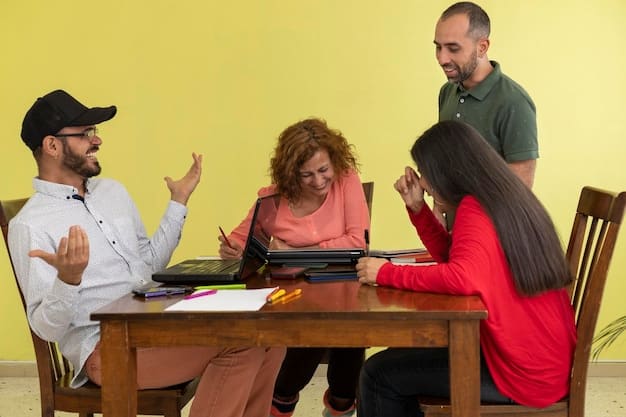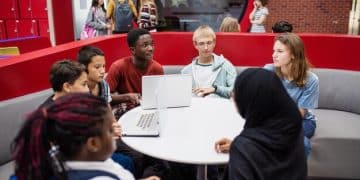Encouraging Youth Participation in Public Policy Debates: A Guide

Encouraging young people to participate in public policy debates involves creating inclusive platforms, promoting civic education, and leveraging technology to foster engagement and empower youth voices.
How Can We Encourage More Young People to Participate in Public Policy Debates? This question is increasingly vital in shaping a future that reflects the concerns and aspirations of the next generation. Engaging young people in public policy not only enriches the debate but also ensures policies are relevant and effective for all age groups.
Why Youth Participation Matters in Public Policy Debates
The voices of young people are essential in public policy debates, bringing fresh perspectives and innovative solutions. They are the future stakeholders, and their involvement ensures that policies address their concerns and long-term needs.
Ignoring youth participation risks creating policies that lack relevance and foresight.
Benefits of Youth Involvement
By actively involving youth, public policy debates gain a broader understanding of societal needs and foster a more inclusive democratic process.
- Innovative Solutions: Young people often bring unconventional ideas and perspectives that can lead to more creative and effective policy solutions.
- Long-Term Relevance: Their involvement ensures that policies consider future implications and address issues such as climate change and education reform.
- Increased Civic Engagement: Participating in public policy debates encourages young people to become more active and informed citizens, strengthening democracy.
- Diverse Representation: Youth from diverse backgrounds can bring unique experiences and perspectives, ensuring that policies address the needs of all segments of society.
Ultimately, engaging young people in public policy is not just about including them; it’s about creating a better, more representative future for everyone, ensuring the policies of today and tomorrow actively consider their needs and aspirations.

Creating Inclusive Platforms for Youth Voices
Creating dedicated platforms where young people feel welcome and heard is crucial for encouraging their participation in public policy debates. These platforms should be designed to be accessible, safe, and empowering.
By providing the right supportive environment, we can unlock the potential of youth voices in shaping public policy.
Designing Youth-Friendly Forums
Youth-friendly forums should be designed to be accessible, inclusive, and engaging, considering the unique needs and preferences of young people.
- Accessibility: Ensure that platforms are easily accessible through various channels, including online forums, community centers, and school initiatives.
- Inclusivity: Promote diversity and inclusivity by encouraging participation from youth of all backgrounds and perspectives.
- Engagement: Use interactive formats, such as workshops, simulations, and debates, to make the discussions more engaging and relevant to young people.
- Safety: Create a safe and supportive environment where young people feel comfortable expressing their views without fear of judgment or discrimination.
These forums provide a valuable opportunity for young individuals to actively shape policies, share their insights, and contribute to solving community and global issues, ensuring their voices are considered.
Promoting Civic Education and Awareness
Enhancing civic education and awareness is essential for empowering young people to participate effectively in public policy debates. A strong foundation in civics equips them with the knowledge and skills to understand and engage with complex policy issues.
Investing in civic education is an investment in the future of democracy.
Integrating Civics into Education
Schools and educational institutions can play a vital role in promoting civic education by integrating it into the curriculum and providing opportunities for hands-on learning.
Incorporate civics into the curriculum and provide opportunities for hands-on learning to empower young participants to thoughtfully engage with intricate policy matters.
- Curriculum Integration: Incorporate civics into core subjects, such as history, social studies, and language arts, to provide a comprehensive understanding of government and policy-making.
- Hands-On Learning: Organize mock trials, debates, and simulations to provide students with practical experience in civic engagement.
- Guest Speakers: Invite policymakers, community leaders, and activists to speak to students about their experiences and insights.
- Civic Projects: Encourage students to participate in community service projects, voter registration drives, and advocacy campaigns.
By integrating civics into education, we can empower young people to become more informed, engaged, and effective participants in public policy debates, ensuring their voices are heard and valued.
Leveraging Technology for Enhanced Engagement
Utilizing technology can significantly enhance youth engagement in public policy debates by making information more accessible and creating interactive platforms for discussion and collaboration. Digital tools can overcome barriers to participation and empower young people to make their voices heard.
Effectively leveraging technology is key to reaching and engaging with today’s digitally savvy youth.
Digital Platforms for Policy Discussion
Digital platforms can facilitate policy discussions by providing accessible and interactive spaces for young people to share their views, ideas, and experiences.
- Online Forums: Create online forums and discussion boards where young people can debate policy issues, share information, and connect with policymakers.
- Social Media Campaigns: Launch social media campaigns to raise awareness about policy issues and encourage young people to participate in online discussions.
- Mobile Apps: Develop mobile apps that provide access to policy information, voting resources, and opportunities for civic engagement.
- Virtual Town Halls: Organize virtual town halls and webinars featuring policymakers and experts to engage young people in real-time discussions.

Such forums are great opportunities to facilitate policy debates by making accessible and interactive spaces, encouraging young people to share their views, discuss ideas, and share experiences.
Empowering Youth through Skill Development and Mentorship
Providing opportunities for skill development and mentorship can empower young people to participate more confidently and effectively in public policy debates. These programs can equip them with the knowledge, skills, and support they need to make their voices heard.
Investing in youth empowerment is an investment in a more engaged and informed citizenry.
Workshops and Training Programs
Workshops and training programs can provide youth with the skills they need to participate effectively in policy discussions, such as public speaking, critical thinking, and policy analysis.
By developing these crucial skills, young people are more capable of eloquently and logically presenting their perspectives on important matters.
- Public Speaking Training: Organize workshops to help young people develop their public speaking skills and confidence.
- Critical Thinking Exercises: Conduct exercises to improve critical thinking and analytical skills, enabling them to evaluate policy proposals effectively.
- Policy Analysis Sessions: Offer sessions on policy analysis to help young people understand the complexities of policy-making and research.
- Mentorship Programs: Pair young people with mentors who can provide guidance, support, and encouragement as they navigate the world of public policy.
Workshops and trainings not only assist with essential skills, but they also encourage young people to become thoughtful contributors, driving progressive change.
Fostering Collaboration between Youth and Policymakers
Creating opportunities for collaboration between youth and policymakers is essential for ensuring that youth voices are heard and valued in the policy-making process. By working together, young people and policymakers can develop more effective and relevant policies that address the needs of all segments of society.
Stronger policies are built when youth and policymakers collaborate.
Joint Initiatives and Advisory Boards
Establishing joint initiatives and advisory boards can create formal channels for youth input and participation in policy-making, ensuring that their perspectives are considered and valued.
- Youth Advisory Boards: Establish youth advisory boards at the local, state, and national levels to provide input on policy issues and advise policymakers on youth-related matters.
- Joint Policy Initiatives: Launch joint policy initiatives bringing together young people and policymakers to address specific issues, such as education reform or climate change.
- Consultation Workshops: Organize consultation workshops and focus groups to gather youth input on policy proposals and ensure that their perspectives are considered.
- Mentorship Programs: Connect policymakers with young mentors and advisors who can provide guidance, support, and encouragement as they navigate civic processes.
These valuable initiatives help ensure that policymakers understand concerns and ideas, which facilitates the development of responsive and effective policies that benefit the entire community.
| Key Point | Brief Description |
|---|---|
| 🗣️ Inclusive Platforms | Create safe and accessible spaces for youth to express their views. |
| 📚 Civic Education | Enhance understanding of government and policy-making in schools. |
| 📱 Technology | Leverage digital tools to increase access and participation. |
| 🤝 Collaboration | Foster partnerships between youth and policymakers. |
FAQ
▼
Young people bring unique perspectives and innovative solutions to policy issues. Their involvement ensures that policies consider their needs and the long-term impacts on future generations.
▼
Schools can integrate civics into the curriculum, organize mock trials and debates, invite guest speakers, and encourage participation in community service projects and voter registration drives.
▼
Technology can enhance youth engagement by providing access to information, creating interactive platforms for discussion, and facilitating collaboration between young people and policymakers through virtual town halls and online forums.
▼
Youth advisory boards provide a direct channel for young people to offer input on policy issues. This ensures that policymakers consider their perspectives and insights when making decisions about youth-related matters.
▼
Essential skills include public speaking, critical thinking, policy analysis, and the ability to articulate ideas clearly and persuasively. These skills enable young people to confidently engage in policy discussions.
Conclusion
Encouraging youth participation in public policy debates is essential for creating a more inclusive, representative, and effective democracy. By fostering inclusive platforms, promoting civic education, leveraging technology, and providing opportunities for skill development and collaboration, we can empower young people to shape the future and build a better society for all.





